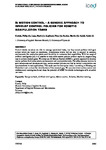Ai Motion Control – A Generic Approach to Develop Control Policies for Robotic Manipulation Tasks
| dc.contributor.author | Kurrek, P | en |
| dc.contributor.author | Jocas, M | en |
| dc.contributor.author | Zoghlami, F | en |
| dc.contributor.author | Stoelen, M | en |
| dc.contributor.author | Salehi, V | en |
| dc.date.accessioned | 2022-01-14T13:49:16Z | |
| dc.date.available | 2022-01-14T13:49:16Z | |
| dc.date.issued | 2019-07 | en |
| dc.identifier.uri | http://hdl.handle.net/10026.1/18556 | |
| dc.description.abstract |
<jats:title>Abstract</jats:title><jats:p>Current robotic solutions are able to manage specialized tasks, but they cannot perform intelligent actions which are based on experience. Autonomous robots that are able to succeed in complex environments like production plants need the ability to customize their capabilities. With the usage of artificial intelligence (AI) it is possible to train robot control policies without explicitly programming how to achieve desired goals. We introduce AI Motion Control (AIMC) a generic approach to develop control policies for diverse robots, environments and manipulation tasks. For safety reasons, but also to save investments and development time, motion control policies can first be trained in simulation and then transferred to real applications. This work uses the descriptive study I according to Blessing and Chakrabarti and is about the identification of this research gap. We combine latest motion control and reinforcement learning results and show the potential of AIMC for robotic technologies with industrial use cases.</jats:p> | en |
| dc.format.extent | 3561 - 3570 | en |
| dc.language.iso | en | en |
| dc.publisher | Cambridge University Press (CUP) | en |
| dc.title | Ai Motion Control – A Generic Approach to Develop Control Policies for Robotic Manipulation Tasks | en |
| dc.type | Conference Contribution | |
| plymouth.issue | 1 | en |
| plymouth.volume | 1 | en |
| plymouth.journal | Proceedings of the Design Society: International Conference on Engineering Design | en |
| dc.identifier.doi | 10.1017/dsi.2019.363 | en |
| plymouth.organisational-group | /Plymouth | |
| plymouth.organisational-group | /Plymouth/Faculty of Science and Engineering | |
| plymouth.organisational-group | /Plymouth/REF 2021 Researchers by UoA | |
| plymouth.organisational-group | /Plymouth/REF 2021 Researchers by UoA/UoA11 Computer Science and Informatics | |
| dcterms.dateAccepted | 2019-01-01 | en |
| dc.rights.embargodate | 2022-01-15 | en |
| dc.identifier.eissn | 2220-4342 | en |
| dc.rights.embargoperiod | Not known | en |
| rioxxterms.versionofrecord | 10.1017/dsi.2019.363 | en |
| rioxxterms.licenseref.uri | http://www.rioxx.net/licenses/all-rights-reserved | en |
| rioxxterms.licenseref.startdate | 2019-07 | en |
| rioxxterms.type | Conference Paper/Proceeding/Abstract | en |


